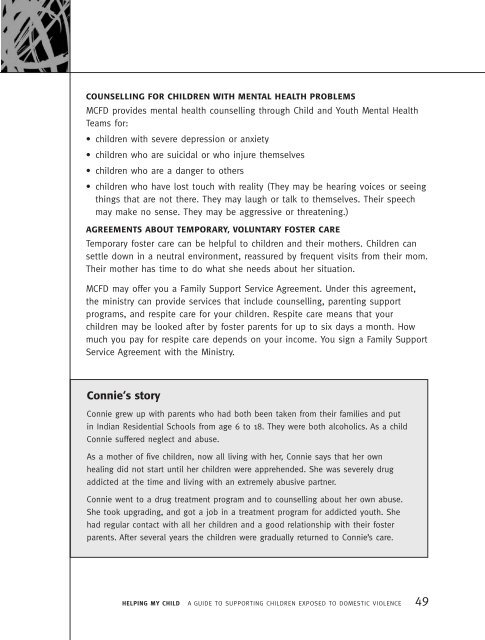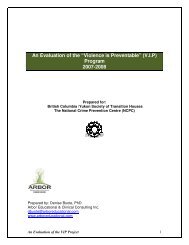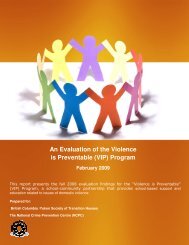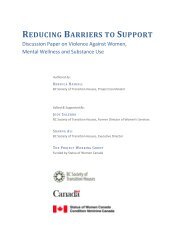a guide to supporting children exposed to domestic violence
a guide to supporting children exposed to domestic violence
a guide to supporting children exposed to domestic violence
Create successful ePaper yourself
Turn your PDF publications into a flip-book with our unique Google optimized e-Paper software.
COUNSELLING FOR CHILDREN WITH MENTAL HEALTH PROBLEMS<br />
MCFD provides mental health counselling through Child and Youth Mental Health<br />
Teams for:<br />
• <strong>children</strong> with severe depression or anxiety<br />
• <strong>children</strong> who are suicidal or who injure themselves<br />
• <strong>children</strong> who are a danger <strong>to</strong> others<br />
• <strong>children</strong> who have lost <strong>to</strong>uch with reality (They may be hearing voices or seeing<br />
things that are not there. They may laugh or talk <strong>to</strong> themselves. Their speech<br />
may make no sense. They may be aggressive or threatening.)<br />
AGREEMENTS ABOUT TEMPORARY, VOLUNTARY FOSTER CARE<br />
Temporary foster care can be helpful <strong>to</strong> <strong>children</strong> and their mothers. Children can<br />
settle down in a neutral environment, reassured by frequent visits from their mom.<br />
Their mother has time <strong>to</strong> do what she needs about her situation.<br />
MCFD may offer you a Family Support Service Agreement. Under this agreement,<br />
the ministry can provide services that include counselling, parenting support<br />
programs, and respite care for your <strong>children</strong>. Respite care means that your<br />
<strong>children</strong> may be looked after by foster parents for up <strong>to</strong> six days a month. How<br />
much you pay for respite care depends on your income. You sign a Family Support<br />
Service Agreement with the Ministry.<br />
Connie‘s s<strong>to</strong>ry<br />
Connie grew up with parents who had both been taken from their families and put<br />
in Indian Residential Schools from age 6 <strong>to</strong> 18. They were both alcoholics. As a child<br />
Connie suffered neglect and abuse.<br />
As a mother of five <strong>children</strong>, now all living with her, Connie says that her own<br />
healing did not start until her <strong>children</strong> were apprehended. She was severely drug<br />
addicted at the time and living with an extremely abusive partner.<br />
Connie went <strong>to</strong> a drug treatment program and <strong>to</strong> counselling about her own abuse.<br />
She <strong>to</strong>ok upgrading, and got a job in a treatment program for addicted youth. She<br />
had regular contact with all her <strong>children</strong> and a good relationship with their foster<br />
parents. After several years the <strong>children</strong> were gradually returned <strong>to</strong> Connie’s care.<br />
HELPING MY CHILD A GUIDE TO SUPPORTING CHILDREN EXPOSED TO DOMESTIC VIOLENCE 49






